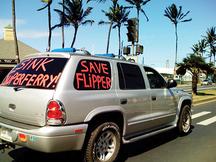October 11, 2007
 |
 |
 |
On Tuesday morning, after a full month of pleadings, testimony, and cross-examination in Maui Circuit Court regarding Hawaii Superferry, Judge Joseph Cardoza issued the long-awaited ruling on a request to keep the ferry service docked until an environmental document is prepared. The standing-room only crowd in his fourth floor courtroom listened intently, hanging on every word.
"It is not our place to rewrite the laws," Cardoza spoke. He read verbatim from portions of Chapter 343 of the Hawaii Revised Statutes, adopted in accordance with the Hawaii Environmental Policies Act. He explained that HRS 343.5, "sets forth a process which must be followed, requiring acceptance of a final document [Environmental Assessment or Environmental Impact Statement] prior to commencement of the proposed action."
Cardoza concluded that after, "careful, thoughtful, thorough analysis of the issues, the law gives the court a clear, concise direction." He ordered an injunction preventing Superferrry's use of Kahului Harbor facilities previously exempted from environmental review, and declared the Operating Agreement between the Hawaii Department of Transportation and Superferry to be void.
In the halls outside the courtroom after the hearing, a barrage of Honolulu television cameras and lights surrounded Isaac Hall, attorney for three Maui groups that challenged the DOT's original exemption of the project from environmental review. "I think it's about time that Hawaii Superferry started telling the truth to the people in Hawaii," stated Hall. He explained that one of the corporation's directors had just revealed that the long-range plan would eventually encompass five fast-ferry vessels shuttling between the islands, not just two.
Representatives of environmental groups, and even Maui's mayor expressed their gratification at Judge Cardoza's ruling, upholding the integrity of Hawaii's environmental laws. It vindicated that concerns over Superferry impacts first raised three years ago were indeed valid.
Yet, Tuesday afternoon, Governor Linda Lingle met with Senate President Colleen Hanabusa and House Speaker Calvin Say to discuss convening a special legislative session to consider passing a law to allow Superferry to sail. Hall was asked to comment on the possibility of a special session. "It's always been a terrible idea to bail out one business or corporation that made a bad business decision," he replied.
"Because the state and Hawaii Superferry chose the path of putting their heads in the sand and trying to deny that an EA was required, they're in this situation now."
Governor Lingle recently said she had, "never experienced the level of rudeness," as she did appearing before a crowd of around 1,000 citizens on Kauai, where the intent of the meeting was to explain security measures to be implemented in the harbor upon the next arrival of Hawaii Superferry.
Perhaps Lingle forgot the treatment she herself gave to Kauai citizens months ago, when they arrived at her Honolulu office to present a petition with 6,500 signatures, seeking an EIS before implementing ferry service. Lingle and her staff turned away the Kauai contingent, without accepting the petition or giving them audience.
Will Lingle, the "ferry godmother", add fuel to the fire of Neighbor Island discontent by encouraging a special session to undermine existing environmental laws?
Judge Cardoza, in his preamble to the final ruling, sought to diffuse the divisiveness of the issues. "We can have different view," said Cardoza, "but we do not need to have a divided community. Show respect and concern for your fellow citizens, and work to resolve the issues before us today."
Wise words, indeed.